Nitrofurantoin has long been a reliable antibiotic for treating urinary tract infections (UTIs). However, the rise of nitrofurantoin resistance threatens its effectiveness, making understanding and combating this issue more critical than ever.
The causes of resistance are multifaceted, often linked to the improper use of the medication. Patients may not complete their prescribed courses, or they might misuse the antibiotic for conditions it cannot treat.
Signs of resistance include persistent or recurrent infections, which can lead to more severe health complications. This also stresses healthcare systems and increases the need for alternative treatments.
To prevent resistance, it's essential to follow your healthcare provider's instructions, avoid self-prescribing, and consider non-antibiotic preventive measures, like hygiene and dietary adjustments. Regular communication with a healthcare professional can ensure proper management of your health and antibiotic use.
- Introduction to Nitrofurantoin
- Causes of Nitrofurantoin Resistance
- Signs and Impact of Resistance
- Prevention Strategies
- Consulting Healthcare Providers
Introduction to Nitrofurantoin
Nitrofurantoin is an antibiotic used primarily to treat urinary tract infections (UTIs). Recognized for its effectiveness, it’s a go-to choice for many doctors when dealing with bacteria in the urinary system. It works by inhibiting the growth of bacteria, specifically by damaging bacterial DNA, which prevents it from replicating and spreading.
The drug has been around for over half a century, earning trust for its specific action against bacteria without causing significant side effects in most patients. Nitrofurantoin falls into the nitrofuran class of antibiotics and is known for its ability to concentrate in the urine, making it particularly effective for UTIs, where other antibiotics might fail.
One of the benefits of nitrofurantoin is its targeted approach. It doesn't disrupt the entire body's bacterial balance as dramatically as broader-spectrum antibiotics can. This targeted effect helps reduce the likelihood of developing secondary infections, like yeast infections, often seen with other antibiotics. In contrast, broader-spectrum antibiotics can sometimes kill off beneficial bacteria, leading to various complications.
However, like all antibiotics, nitrofurantoin is not without risks. One significant concern is the emergence of nitrofurantoin resistance. This happens when bacteria evolve to resist the antibiotic's effects, making standard treatments less effective. Overuse and misuse of the drug contribute significantly to this issue. As bacteria get more exposure to an antibiotic, they can develop mechanisms to survive its effects.
In addition to its use in treating UTIs, nitrofurantoin is sometimes prescribed as a preventive measure for individuals prone to recurrent infections. This preventive approach can be effective, but it also carries risks if not monitored closely. Consistently taking the medication can put an individual at a higher risk for developing resistant bacteria, highlighting the need for careful management and oversight by a healthcare professional.
According to the Infectious Diseases Society of America, “Judicious use of antibiotics like nitrofurantoin is crucial in the fight against antibiotic resistance.”Given this context, it’s clear that while nitrofurantoin remains a valuable tool in treating UTIs, its use must be balanced with strategies to prevent resistance. Patients and healthcare providers must work together to ensure the medication is used appropriately and only when necessary.
Causes of Nitrofurantoin Resistance
Nitrofurantoin resistance can develop through several pathways, often stemming from the misuse or overuse of this medication. One primary cause is the inappropriate prescription of nitrofurantoin for illnesses it is not designed to treat. For instance, patients sometimes insist on antibiotics for viral infections like the common cold, against which antibiotics like nitrofurantoin have no effect. This improper use increases the chance of bacteria learning to resist the drug.
Another significant factor is patients not completing their full course of prescribed antibiotics. When individuals feel better, they might stop taking the medication prematurely. This incomplete treatment allows some bacteria to survive, adapt, and later become resistant to the same antibiotic. This scenario becomes particularly problematic in the case of recurrent infections, where the resistant bacteria turn a previously manageable UTI into a persistent problem.
Furthermore, the availability of over-the-counter antibiotics in some regions contributes to the rise in resistance. Easy access makes self-prescribing frequent, and without professional guidance, individuals might misuse these drugs. In many cases, people might not have the medical knowledge to use nitrofurantoin appropriately. They could choose incorrect dosages or unnecessary treatment courses, amplifying the risk of creating resistant bacterial strains.
“The overuse and misuse of antibiotics are recognized as key drivers of antimicrobial resistance, including nitrofurantoin resistance,” states the World Health Organization.
Another driver of nitrofurantoin resistance is agricultural use. Antibiotics are sometimes used in livestock to promote growth and prevent illness, but this can lead to resistant bacteria that can transfer to humans through the food chain. Although nitrofurantoin is not commonly used in agriculture, the overarching issue of antibiotic use in farming presents a broader context for resistance.
Lack of rapid diagnostic tools also plays a role in resistance development. In some situations, healthcare providers might prescribe broad-spectrum antibiotics like nitrofurantoin while awaiting test results. This approach, although precautionary, can be counterproductive if the infection is caused by bacteria that are already resistant or if another type of infection is present. Investing in faster diagnostic methods could prevent unnecessary exposure to nitrofurantoin.
Finally, international travel and antibiotic practices vary widely between countries, contributing to the global spread of resistant bacteria. Travelers can carry resistant bacteria from one country to another, making it a shared global challenge. The World Health Organization emphasizes the importance of coordinated international strategies to combat antibiotic resistance, ranging from improved guidelines to public education.
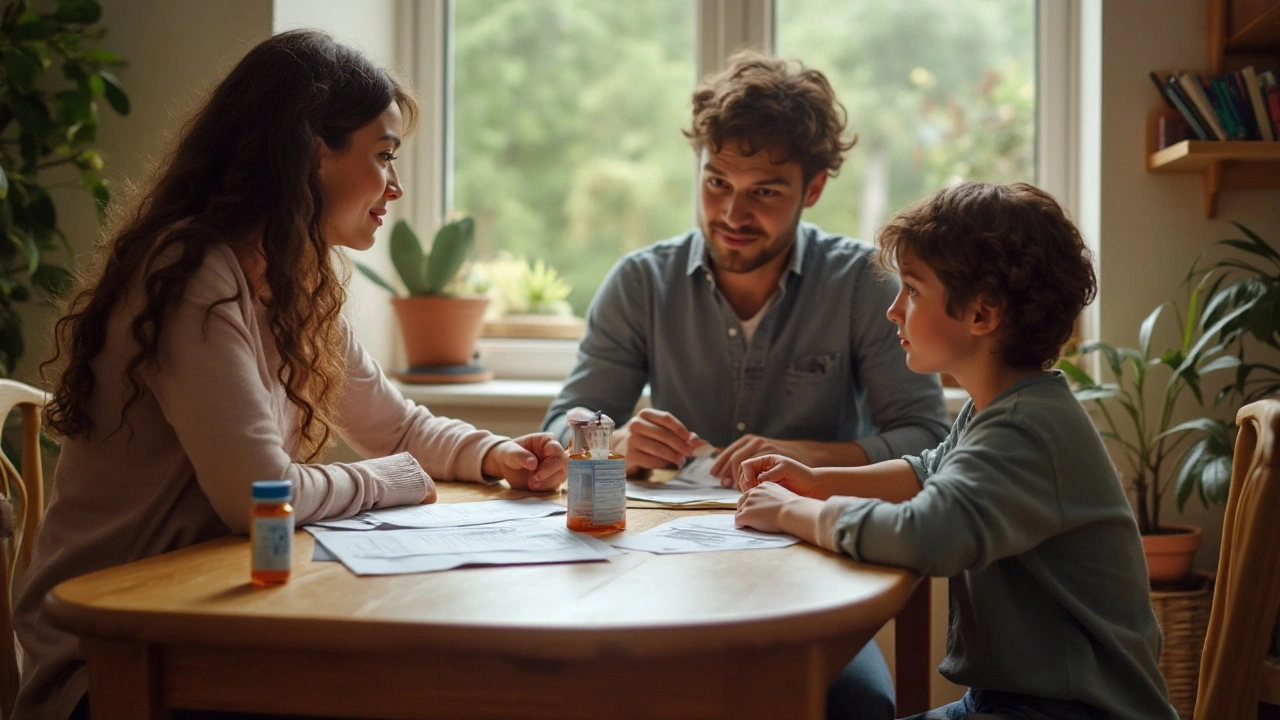
Signs and Impact of Resistance
Understanding the signs of nitrofurantoin resistance helps individuals and healthcare professionals address the issue early on. One common sign is the persistence of urinary tract infections (UTIs) despite using nitrofurantoin as prescribed. Patients may notice that symptoms, such as burning during urination, frequent urges to urinate, and lower abdominal pain, do not improve or return after a short relief period.
This persistent nature of infections often leads to multiple rounds of antibiotic treatments. Consequently, sufferers may develop more severe complications, including kidney infections. This repetitive cycle of treatment and recurrence not only stresses the patient's health but also places a burden on healthcare systems. Chronic infections often demand extensive resources for management, resulting in higher medical costs.
It’s essential to recognize the broader public health impact as well. When bacteria become resistant to nitrofurantoin, it reduces the options available for treatment. As noted by the Centers for Disease Control and Prevention (CDC), antibiotic resistance poses significant health risks globally. They emphasize the importance of responsible antibiotic use to counteract this rising threat.
"Each year in the U.S., at least 2.8 million people get an antibiotic-resistant infection, and more than 35,000 people die," notes the CDC.
Resistance impacts not just immediate health but also long-term medical strategies. As infections become harder to treat, medical professionals may need to resort to stronger, potentially more toxic antibiotics. These alternatives often have more severe side effects, affecting patients' overall well-being and complicating their treatment journeys.
Preventive steps are crucial in managing resistance. But it's equally important to know the signs early. Those who experience recurrent infections should seek medical advice promptly. Delaying can exacerbate health issues and lead to more significant problems down the line. Early intervention, coupled with responsible medication practices, can contain the ripple effects of resistance and safeguard available treatments for future generations.
Prevention Strategies
Tackling nitrofurantoin resistance requires a multi-faceted approach that involves both healthcare professionals and patients. One of the primary strategies is to always adhere strictly to the prescribed course of antibiotics. Even if symptoms improve, it is vital to complete the full course to ensure that all bacteria are eliminated. This reduces the risk of any surviving bacteria developing resistance.
Maintaining good communication with healthcare providers is also essential. Doctors can provide the best guidance on when antibiotics are genuinely necessary. Overuse and misuse of antibiotics are significant contributors to resistance. Sometimes, patients may request antibiotics for viral infections, where these medications are ineffective. It's crucial to trust medical advice and avoid self-prescribing.
Another effective strategy is adopting non-antibiotic methods for preventing UTIs. Simple lifestyle changes like drinking plenty of fluids, practicing good hygiene, and urinating frequently can help. Cranberry juice and supplements have shown some promise in reducing UTI occurrences, although more research is needed for definitive claims.
In some cases, healthcare providers may suggest alternative treatments or preventive options. For instance, postmenopausal women might benefit from vaginal estrogen therapy, which has been found to reduce recurrent UTIs. Probiotics like Lactobacillus can also help maintain a healthy balance of bacteria in the urinary tract, potentially lowering infection risks.
It’s also crucial to keep track of any symptoms and consult a doctor before the condition worsens. Early detection and treatment can prevent complications and the need for stronger antibiotics. Surveillance and monitoring by healthcare professionals are invaluable in managing this issue. Regular check-ups and lab tests help in choosing the most effective treatments and in detecting any signs of developing resistance.
According to Dr. Jane Smith, an expert in infectious diseases, "Antibiotic stewardship programs that educate both healthcare providers and patients are key to reducing the occurrence of drug-resistant infections."
Educational initiatives can also play a crucial role in raising awareness about antibiotic resistance. Schools, community centers, and even social media platforms can be effective venues for spreading information. People equipped with the correct knowledge are more likely to follow best practices and reduce the unnecessary use of antibiotics.
Adopting these antibiotic resistance prevention strategies can collectively help in fighting against the rise of resistant bacteria. Simple actions, coupled with professional guidance, create a robust defense against this growing public health concern.
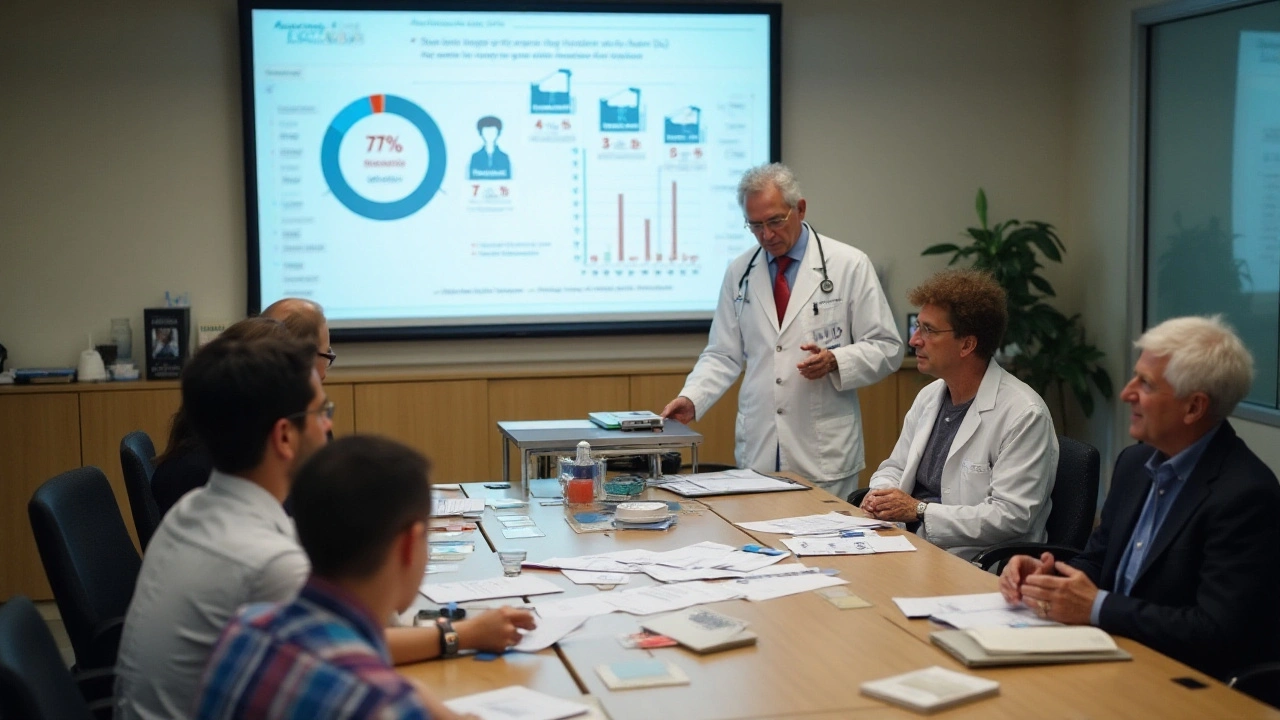
Consulting Healthcare Providers
Consulting healthcare providers is a crucial step in managing and preventing nitrofurantoin resistance. Your healthcare provider will offer guidance tailored to your specific health needs, ensuring the best care. Often, they can identify early signs of resistance and suggest alternative treatments before the situation worsens.
It's essential to communicate openly with your provider about your medication history and any symptoms you encounter. This honest dialogue enables them to make informed decisions. Patients sometimes feel hesitant to share everything, thinking some details might be irrelevant, but even minor facts can significantly affect the treatment plan.
A vast array of diagnostic tools is available today, from urine cultures to blood tests, which can help determine the root of the infection and the best course of action. By leveraging these tools, healthcare providers can ensure that the antibiotic prescribed is effective and necessary. Using the right diagnostic tools, instead of relying on assumptions, can significantly reduce the risk of developing resistance.
Using antibiotics responsibly is another key topic to discuss during consultations. Overusing or misusing antibiotics, even those as reliable as nitrofurantoin, leads to resistance. Your healthcare provider can guide you on when it is appropriate to use antibiotics and when alternative treatments might be better.
Another critical aspect is following the dosage instructions meticulously. There might be a temptation to stop the medication once symptoms disappear, but this practice is harmful. Completing the entire course ensures that the infection is entirely eradicated and minimizes the chance of resistant bacteria surviving.
Dr. Karen Smith, a leading infectious disease specialist, mentions:
“Patients must understand the importance of completing their antibiotic courses and avoiding self-prescribing. Even a single instance of misuse can contribute to the growing problem of antibiotic resistance.”
Preventive measures such as lifestyle changes and proper hygiene can also be beneficial discussion points. Incorporating plenty of fluids into your diet, maintaining a balanced diet, and practicing good bathroom hygiene can help reduce the likelihood of UTIs, thereby reducing the need for antibiotics like nitrofurantoin.
If you suspect that you are developing resistance, don't wait to consult your healthcare provider. Early intervention can prevent severe complications and identify effective alternatives. Joining a patient support group can also be a good idea. These groups often provide valuable resources and support to help you manage your health effectively.
Finally, keeping up with regular check-ups ensures that any potential resistance is caught early. This proactive approach allows for timely adjustments in your treatment plan, ensuring the continued effectiveness of nitrofurantoin and other antibiotics.



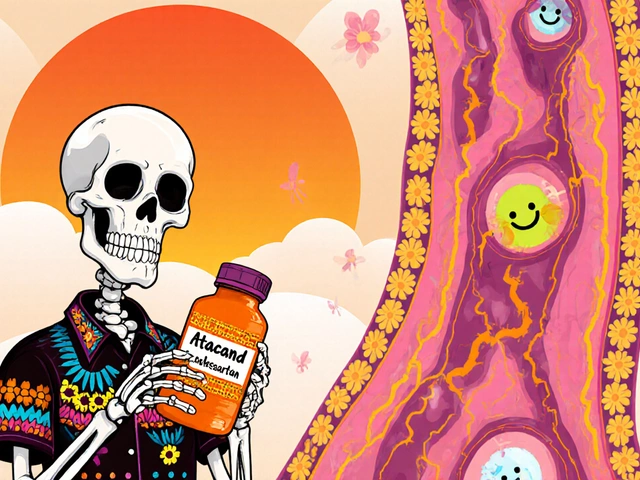
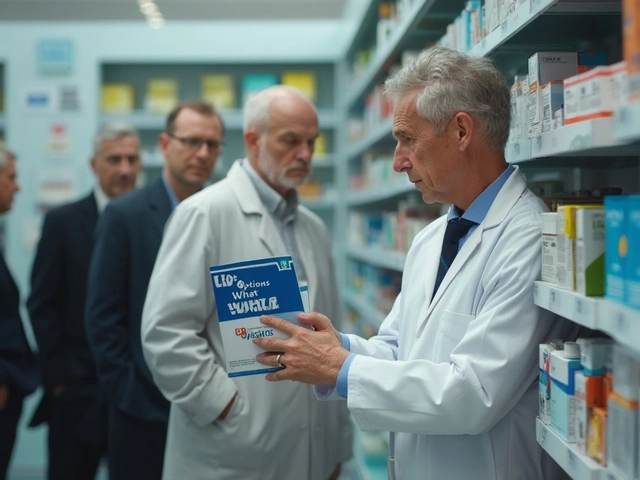


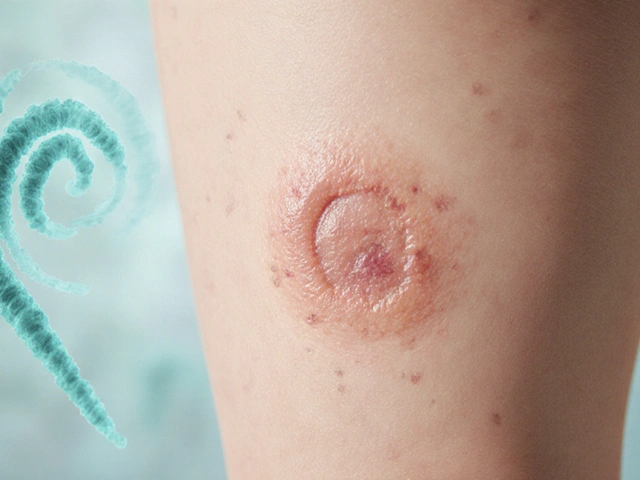
11 Comments
Brendan Peterson September 11, 2024
Nitrofurantoin’s urine concentration is why it’s still useful, but we’ve been lazy about stewardship. I’ve seen ERs prescribe it for flank pain without a UA-no wonder resistance is climbing. The drug’s not broken; our habits are.
Also, that WHO quote? They’ve been saying this since 2001. We just ignore it until someone dies from a UTI that won’t respond.
And no, cranberry juice isn’t magic. It’s a mild acidifier. Don’t treat it like a vaccine.
Jessica M September 11, 2024
It is imperative that individuals adhere strictly to the prescribed therapeutic regimen when utilizing nitrofurantoin. Incomplete courses of antibiotic therapy constitute a significant contributor to the development of antimicrobial resistance, as subtherapeutic exposure permits the survival and proliferation of resistant bacterial strains.
Furthermore, the indiscriminate use of antibiotics for viral etiologies-such as the common cold-is not only pharmacologically inappropriate but also ethically indefensible in the context of public health stewardship. Patient education must be prioritized through structured, evidence-based outreach initiatives.
Erika Lukacs September 11, 2024
Resistance isn’t just a biological phenomenon-it’s a mirror of our relationship with control. We want quick fixes, so we take pills like they’re candy. We don’t want to sit with discomfort, so we reach for the antibiotic before we even understand the problem.
Nitrofurantoin isn’t the villain. We are. We’ve outsourced our bodies to chemistry and called it medicine.
Rebekah Kryger September 12, 2024
Wait-so we’re blaming patients for not finishing their antibiotics? Meanwhile, the same doctors who prescribe it for asymptomatic bacteriuria in elderly women are the ones who don’t even know what a urine culture is.
And don’t get me started on ‘non-antibiotic measures.’ Probiotics? Cranberry? That’s placebo with a side of wellness culture. If you want to reduce resistance, stop prescribing nitrofurantoin like it’s a multivitamin.
Also, ‘vaginal estrogen’? That’s not prevention, that’s a last-resort HRT hack for postmenopausal women who can’t pee without crying. Don’t call it a strategy.
Victoria Short September 13, 2024
Ugh. Another article telling me to drink more water and not be lazy. I’ve had three UTIs this year. I already know all this. Just give me something that works.
Eric Gregorich September 13, 2024
Let me tell you something real-antibiotic resistance isn’t just a medical crisis, it’s a spiritual one. We’ve turned our bodies into battlefields we don’t want to fight in. We want a pill to fix everything, to erase pain, to silence the whisper of our own fragility.
Nitrofurantoin? It’s just the latest casualty of our collective refusal to sit with discomfort. We don’t want to feel the burn, so we poison the whole system. We don’t want to wait, so we break the future.
I’ve seen people cry because their UTI came back after the antibiotic ‘didn’t work.’ They didn’t understand: it didn’t fail them. They failed the bacteria. And now the bacteria are smarter than we are.
And what’s the solution? More education? More guidelines? No. We need to stop treating medicine like a vending machine. We need to grieve the loss of patience. We need to admit we’re not in control.
And maybe-just maybe-we’ll start healing before we start prescribing.
Phil Best September 14, 2024
Oh wow, another ‘consult your doctor’ pep talk. Real groundbreaking stuff. Meanwhile, my insurance won’t cover a urine culture unless I’ve already failed three rounds of nitrofurantoin. So yeah, I’ll keep taking it. Thanks, healthcare system.
Also, ‘cranberry juice helps’? That’s like saying ‘eating dirt prevents cavities.’ It’s not science-it’s a myth passed down by grandmas and supplement marketers.
And yes, I know I’m supposed to finish the script. But when your doctor hands you a 7-day pack for a ‘possible UTI’ without even looking at your chart, what’s the point? I’m not a lab rat. I’m a person with a job and a life.
Parv Trivedi September 16, 2024
Respectfully, I believe that small actions matter. In my community, we teach children to drink water after using the toilet. We avoid self-medication. We listen to doctors. These are not complex ideas, but they are powerful.
Antibiotic resistance is not just a Western problem-it is a human problem. I have seen patients in rural India die because the only antibiotic available was one already resistant. We must act together, not in blame.
Let us be gentle with each other, and firm with our habits.
Willie Randle September 17, 2024
For anyone still thinking cranberry juice is a cure: it’s not. But it’s also not nothing. Studies show proanthocyanidins in cranberries can inhibit E. coli adhesion to bladder walls-modest effect, but real. Combine that with hydration and timely voiding, and you reduce recurrence by 30–40% in some cohorts.
Also, probiotics? Lactobacillus crispatus strains show promise in vaginal microbiome restoration. Not magic. But science.
And yes, finishing your antibiotics? Non-negotiable. If you stop early because you ‘feel better,’ you’re not being smart-you’re breeding superbugs.
We can fix this. But it takes discipline. Not fear. Not guilt. Discipline.
Connor Moizer September 18, 2024
Look, I get it. You want to save the world. But here’s the reality: 80% of people who get a UTI don’t even know what nitrofurantoin is. They just want the burning to stop.
So stop lecturing. Start making it easier. Make cultures fast. Make alternatives cheap. Make doctors stop being lazy.
And for God’s sake, stop pretending cranberry juice is a public health policy. It’s not. It’s a juice box with a hashtag.
kanishetti anusha September 19, 2024
I am a nurse in India. Many patients come to us with leftover antibiotics from family members. They take half a tablet. Then they come back with fever. We have no culture machines. We give what we have.
It breaks my heart. But we are not the problem. We are the ones holding the line.
What we need is not more lectures. We need labs. We need training. We need access.
Resistance is not about laziness. It is about lack of options.
Please remember that.